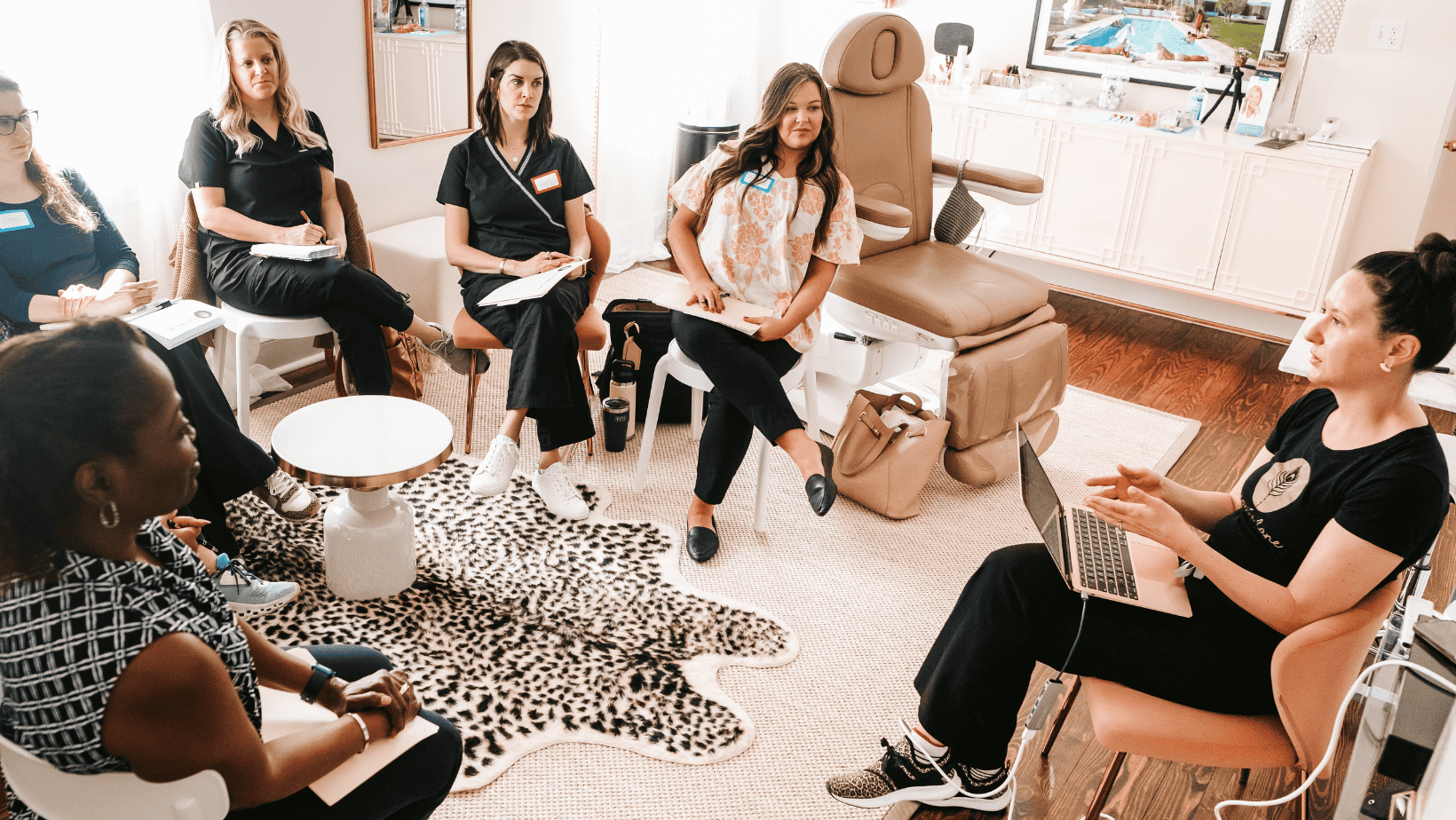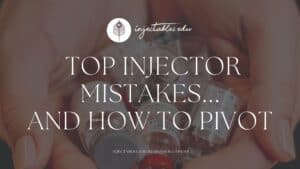Hi, Cassie from Injectables EDU here! We talk to a lot of injectors–aspiring, expert, and everywhere in between. One thing that we all have in common? We all make mistakes. And on the road to becoming a master injector, or a business owner, there are PLENTY of chances to take a wrong turn. Believe us, we’ve been there. And we figured it out. And so you will. But lucky for you, we’re here to help give you a head start. We polled our top injectors from around the country and compiled a list of the top ten mistakes aesthetics business owners make–and what you can do instead.
1. Underestimating the administrative time commitment
This is not, I repeat, this is not going to lead you to have more time to spend with your family. Most practitioners, like myself, will work another job when they first start. That’s because full-time, or part-time, job provides the financial stability you need to invest in a new business. Your fledgling business is going to be born from your free time. This means that the business will take away from time with friends and family. Prepare yourself to spend (almost) every spare minute on the administrative time commitment.
A lot of us, myself included, started this journey with the desire to have more time with my family. I quickly found that being a business owner is less about more time for family, and more about having more flexibility and control of your schedule. When you run your own business, you can take any day off you please. The problem is that, especially in the beginning, your business is going to be like a baby–completely reliant on you (and even keeping you up at night).
Here’s what you do have to look forward to–a renewed feeling of passion and excitement about your career. I now know that the saying, “If you love what you do, you will never work a day in your life” to be true. But that knowledge has come at the emotional and (initially) financial expense of my family. And you should prepare for the same.
I’m happier than I have ever been and fulfilled by this purpose in my business. But I ask you to take a look at your personal finances and your personal life. Ask yourself, can they both sustain a 1 to 2 year deficit? If this is your passion, it is worth the dedication. But a shift from employee to business owner does not come without a true mindset shift. Do not underestimate just how much time this will take.
2. Not picking your training course strategically
Planning to just take the closest, or cheapest, introductory class? Picture me yelling for this next one: NO! You didn’t pick your nursing school, medical school, physician assistant school, etc. without researching. Why would you pick you foundational course for your new business blindly?
What is the class size? Who will your instructor be? How much hands-on time is included? Does it provider ongoing mentorship? Is there in-depth business information? Where is the class held in an actual med spa? Will I get to inject a full face?
Common pitfalls of classes are numerous. Such as…
- Many classes are held at big hotels with large groups.
- The instructors are hit or miss.
- Being a good injector does not necessarily make a good teacher.
- There is typically little or no ongoing support after your class.
- And notoriously, there is a lack of models to inject.
The biggest disservice in my opinion is the lack of practical business knowledge. Most courses don’t cover ordering information, cost of product, and how to start your business. We are all comfortable learning new clinical skills, however many practitioners starting an aesthetics practice do not have a strong business background.
Check out our Botox Course Comparison Chart first. Ask some important questions about the course you are looking for.
3. Ignoring the fine print when you partner with a doctor
Okay, they provide a space. Sure, they have a receptionist. Yes, you can use their malpractice insurance. And yes, it’s a great safety net. But you are doing yourself, and your future profits, a HUGE disservice if you neglect to pay attention to the terms and conditions of your partnership.
Many new aesthetic business owners think it sounds great to work for a doctor for a year and then start their own practice. Which is nice in theory, but doesn’t work.
Most employers, especially those hiring injectors with little to no previous experience, are going to want some assurance that their new investment (you) won’t just turn into the competition a year down the road. You’re likely going to be expected to sign a non-compete in this situation, which will limit your ability to scale and grow on your own.
This advice goes for any partnership–you absolutely have to have an exit buyout strategy in place. If you figure out this wasn’t a good deal, at least have a parachute. Now, if you don’t have the desire to run your own practice, working for a plastics, derm, med spa, etc. is a great option. Getting in isn’t easy, but it is nice to be able to come to work, do something you love and go home and check out! Go forth and enjoy. But, make sure you read your non-compete and non-solicitation agreements closely.
But if you do have aspirations to run your own practice, and you decide to make some sort of formal partnership that includes a percentage pay, ownership, profit sharing, make sure you have a lawyer draw up very clear documents on how to part ways.
Again, I know it all seems daunting and it seems safer to work for a doctor and learn the ropes. Or even just to be under the umbrella of a physician practice even if that doc doesn’t bring any aesthetic experience to the table. But ask yourself what exactly is this business relationship bringing to the table besides being a security blanket?
4. Only focusing on refining your injector skillset
The actual injecting and making clients look and feel better is the flashy part of running an aesthetics practice. But the behind-the-scenes work that makes that work possible is a huge time investment.
As a business owner, you absolutely cannot neglect the business financials of your practice. It’s not going to be enough to be a strong injector. You have to be an entrepreneur. And understand your profit and your cost of goods.
What we’re saying is–you have to be the boss.
We have a great post and video with more details on this.
As clinicians, typically our strength and focus are inclined to be on the actual needles and technique. This certainly cannot be neglected.
But, I would make a case it’s just as important (maybe even more) to really dive into learning about small businesses. This is an area in which we typically have very little experience. So there is more ground to cover. Injecting is adding one more skill to an already stacked clinical toolbox. I received zero practice management or business didactic in all of my years of schooling up to a Doctorate level degree. Just don’t assume the business will do well solely based on being a strong injector.
You will need business training and time allotted during the week to focus on your administrative work–expect to spend multiple hours of business tasks for every one hour of injecting when you’re first getting started.
5. Making big purchases way too soon
I mean, do you really have that money to blow?
Investing in equipment will likely be something you do want to invest in as you grow. Not as you begin. Any equipment should be bringing you in 5X your monthly payment on it. When you don’t have many clients, you will be drowning in an expensive payment.
Also if you are paying the full retail price for the equipment you are overpaying. Let yourself learn the ropes a bit before you make that level of investment. If you’re not sure if you are getting a deal, you’re not! Getting into a bad laser, body contouring, etc. deals will sink your practice before it has a chance. Until you have hundreds of clients, don’t purchase any equipment more than 10k as a conservative marker. Some early add-on services that have a low barrier to entry are microneedling, chemical peels, vitamin shots, and dermaplaning.
Ok, that’s all for today.
We’ll give you a moment to take that in, and adjust your course accordingly. In part 2 of our series, we break down the remaining top mistakes that aesthetic business owners make when they are first starting.
Oh, and we talked a LOT about training. And that’s because that’s what we do, baby. So when you are ready to take a class, we highly recommend training with Injectables EDU. Our Botox and Business Training Course is a great place to start.
Or, if you have questions about which option works best for your goals, you can schedule a FREE mentoring call with Injectables EDU to talk it out with an expert.






